The Scandals of Donald Trump: Presidential Edition
The thing about scandals is they tend to beget other scandals.
Take the various probes into Russian interference in the election, and whether the Trump campaign colluded with Moscow on those efforts. So far, those investigations are in their early stages and have not produced any definitive information. But in firing FBI Director James Comey, who was overseeing one of the investigations, on May 9, President Trump has created an entirely new scandal.
Trump initially cited a recommendation from the deputy attorney general to justify removing Comey. But that recommendation said that Comey had been out of line in speaking publicly about the investigation into Hillary Clinton’s email, and should not have criticized her. Trump, however, had said Comey dealt too leniently with Clinton, reprising that complaint as recently as May 2. This made the official explanation implausible.
Recommended: The Terrible Cost of Trump's Disclosures to the Russians
Almost immediately, news reports suggested Trump had been moved by outrage about the FBI’s investigation into Russia. The White House denied that, and even Vice President Pence said otherwise. Then, on May 11, Trump said in an interview that he had made his choice before the deputy attorney general’s recommendation, and he said that the Russia probe had been a factor in his decision. He’d made a liar of his vice president and his spokeswoman, as well as contradicting the reasons he gave to Congress for firing Comey.
The result is perhaps the gravest political crisis of Trump’s presidency—no small feat in a presidency consumed by a series of political crises. Immediately upon the dismissal, Democrats and Republicans both voiced concern that Trump was tampering with an investigation into his own administration. Then the president confirmed that he was, in fact, tampering with an investigation into his own administration.
Things have gotten even stranger. After a report that Trump asked Comey to pledge his “loyalty” at a January 27 dinner, Comey associated disputed that. Trump then tweeted that Comey better hope there were not “tapes” (quotation marks his) of their conversations. The remark was either a weird attempt to intimidate a potential opponent or else an admission of a surreptitious taping system, a la Nixon, that would constitute a public record.
Meanwhile, in an attempt to answer concerns about business ties with Russia, Trump released a letter from his tax lawyers that says he had $100 million in income from Russia over the last 10 years or so. Yet even with that huge sum—what the lawyers call “exceptions”—tax experts say that the letter does little to prove anything about Trump’s ties to Russia.
Recommended: What Did Donald Trump Tell the Russians?
These increasingly erratic moves have shaken even some Republicans inclined to stand by Trump, and they have amplified calls for a special counsel or an independent commission to take over the Russia probes. Meanwhile, Democrats allege that Attorney General Jeff Sessions’s involvement in choosing a new FBI director constitutes a violation of his pledge to recuse himself from Russia investigations.
If Trump hoped to stifle Russia questions, as he himself suggested, it has not worked, at least not in the immediate term. The questions have only grown louder. As Trump’s erstwhile pal Bill Clinton can tell him, once investigators start poking at an administration, scandals have a tendency to snowball.
Donald Trump entered the White House as one of the most scandal-tarred presidents in American history—what his imbroglios may have lacked in depth, they made up in variety, encompassing legal, ethical, and sexual controversies. (In a twist, one of Trump’s few competitors for the crown was his rival, Hillary Clinton.) They ranged from race discrimination to mafia connections, from petty hypocrisies to multimillion-dollar alleged frauds.
Related Story
The Many Scandals of Donald Trump: A Cheat Sheet
Now that Trump is president, some of those controversies have continued to shadow him. But the presidency has also occasioned a whole new set of disputes. Looming largest is the question of whether his campaign colluded with Russian agents to interfere in the election, a question being investigated by the FBI as well as panels in both houses of Congress. They also include ethical and legal questions surrounding members of his cabinet, his allegation that Barack Obama spied on him before the election, and various conflicts of interest.
In the spirit of our logs of Clinton and Trump scandals during the presidential campaign, this article will track those controversies, sorting out the legal, ethical, and moral questions and separating the facts from the fury. The list will be updated regularly as there are new developments.
Recommended: Republicans Display a Mix of Defense and Alarm on Trump Allegations
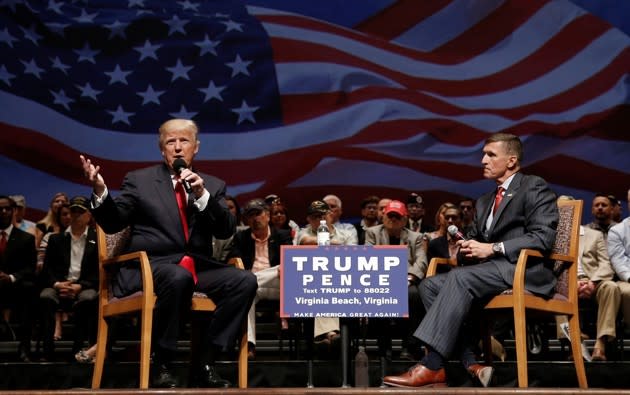
The Firing of Michael Flynn
Who: Flynn, a retired three-star general and Trump’s first national security adviser
The dirt: Flynn cut a controversial figure on the campaign trail as an outspoken Trump surrogate. On November 17, shortly after Trump was elected, Flynn was named his national security adviser. Problems soon emerged. His son had to be fired for spreading bizarre, baseless conspiracy theories. There were also reports that Flynn had spoken with Russian Ambassador Sergei Kislyak prior to Trump’s inauguration about sanctions on Moscow, which Flynn denied. On April 25, the leaders of the House Oversight Committee said they believed Flynn had failed to seek permission (as he had been warned to do) to receive money from the Russian and Turkish governments in 2015 and 2016, and omitted some of them from required disclosures.
The upshot: Flynn was fired on February 13, after it became clear he had lied to Vice President Pence about his conversations with Kislyak. However, Trump reportedly knew about those lies as early as January 26, raising questions about why Flynn’s firing took so long. More questions have emerged since, especially with Flynn’s disclosure that he lobbied for the Turkish government without declaring it prior to his White House appointment. If Flynn failed to seek permission for payments from Russia and Turkey, and to disclose it, he would have committed a crime. More details about Flynn are expected: Through a lawyer, Flynn—who in 2016 said that someone who asks for immunity has probably committed a crime—has reportedly reached out to various investigative bodies to offer immunity in exchange for testimony. So far, no one is known to have granted it.
Read more: The Atlantic, (2), (3)
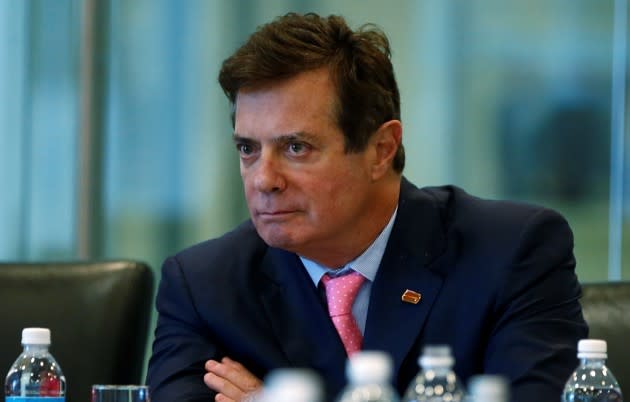
Russian Interference in the 2016 Election
Who: Paul Manafort, former Trump campaign chair; Michael Flynn, former national security adviser; Carter Page, former Trump adviser; unknown others
The dirt: The fact of Russian interference in the election to hurt Hillary Clinton and aid Trump is the subject of consensus in the U.S. government, but whether there were connections between the Trump campaign and those efforts remains unknown. The most explosive allegations were laid out in the infamous unconfirmed dossier a former British intelligence officer prepared. FBI Director James Comey said on March 20 that his agency is “investigating the nature of any links between individuals associated with the Trump campaign and the Russian government, and whether there was any coordination between the campaign and Russia’s efforts.” The Senate and House intelligence committees are also both investigating. Attorney General Jeff Sessions was forced to recuse himself from any investigations after admitting he had not disclosed to Congress meetings with the Russian ambassador. Democrats have argued that Sessions lied under oath by doing so. On April 11, The Washington Post revealed that the FBI sought and received a warrant to Carter Page on suspicion of being a foreign agents. Paul Manafort is also the subject of several inquiries, and reports have pointed to mysterious millions flowing his way; he may register retroactively as a foreign agent under federal law. The Justice Department is reportedly seeking Manafort’s bank records. The Senate Intelligence Committee is seeking communications with Russia from several former Trump aides.
The upshot: Who knows? If Trump aides conspired with a foreign power to influence the election, it would be the biggest political scandal since Watergate. If Trump himself were involved or compromised, as the darkest liberal observers suggest, it would be a scandal without precedent in American history. Adam Schiff, the Democratic ranking member of the House Intelligence Committee, says he has seen “more than circumstantial” evidence of collusion, while Representative Joaquín Castro says he thinks people will go to jail. At the moment, however, there’s minimal public evidence to go on, so the whole thing might very well turn out to be mere innuendo. In firing of James Comey, the FBI director overseeing an investigation into Russian interference, and citing the probe, Trump appears to be tampering with the investigation.
Read more: The Atlantic, (2), (3), The New York Times, Associated Press, The New York Times
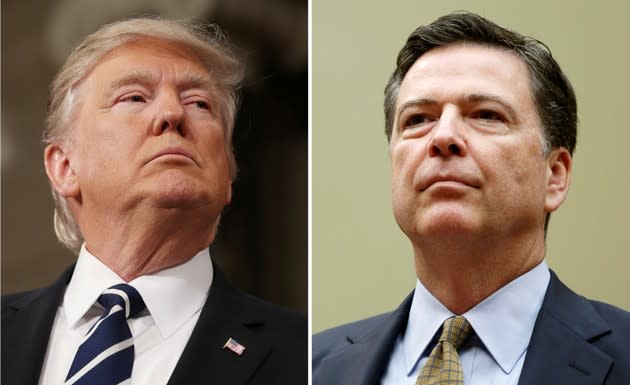
The Firing of James Comey
Who: Trump; former FBI Director James Comey; Attorney General Jeff Sessions; Deputy Attorney General Rod Rosenstein; White House communications staff
The dirt: On May 9, President Trump abruptly fired FBI Director James Comey. Trump cited a recommendation from Rosenstein, who criticized Comey for breaking Justice Department guidelines by being too harsh on Hillary Clinton during an investigation of her emails. Advisers, including Vice President Pence, cited the recommendation. That explanation plainly made no sense, since Trump had previously attacked Comey, as recently as May 2, for being too lenient with Clinton. But then Trump gave an interview on May 11 saying he’d decided to fire Comey long before the recommendation, and said that the FBI’s probe into Russian interference in the election was a factor in his decision. That not only contradicts his stated rationale and the statements of his vice president and press secretary, it’s at odds with what Trump told leaders in Congress. Trump also bizarrely implied he might have secret recordings of conversations with Comey.
The upshot: Although Trump has repeatedly insisted the Russia probe is a “taxpayer-funded charade” and that it will find no collusion between his campaign and Moscow, his decision to suddenly fire the FBI head investigating it has instead encouraged speculation about ties to Russia. The White House did itself no favors with three separate accounts of the timing and reasoning of the firing. Members of Congress in both parties expressed concern about the firing, and the Senate Intelligence Committee hopes to interview Comey. If there are White House tapes, they could be subject to subpoena. Meanwhile, the appearance of political tampering with the investigation has bolstered calls for a special commission or special counsel to investigate Russia-Trump links. Democrats also argue that by participating in the process to replace Comey, Sessions is violating his pledge to recuse himself from involvement in Russia probes.
Read more: The Atlantic
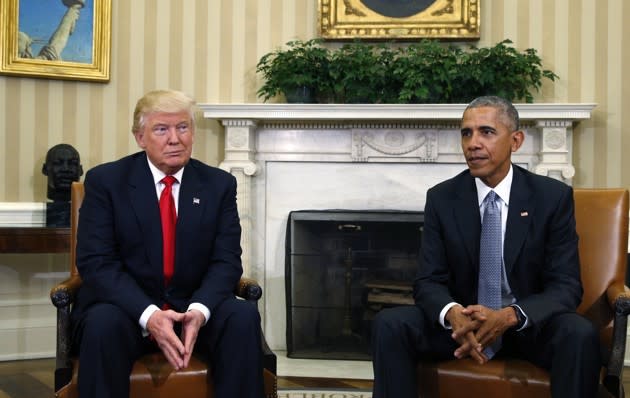
The Obama “Wiretap”
Who: Donald Trump; former President Barack Obama; Fox News analyst Andrew Napolitano; conservative pundit Mark Levin; Breitbart author Joel Pollak
The dirt: On March 4, Trump tweeted that Obama “had my ‘wires tapped’ in Trump Tower just before the victory,” calling it “McCarthyism” and “Nixon/Watergate.” There is no evidence to support Trump’s claim, and FBI Director James Comey said under oath that it was not true. It appears that Trump made his claim based on speculation from Andrew Napolitano on Fox News, Mark Levin’s radio show, and a Breitbart piece by Pollak based on the Levin segment. Despite demanding a congressional investigation, the White House has still not produced any evidence. Trump has tried to change the nature of his claim, first saying he merely meant “surveillance” broadly. Later, after the White House claimed (again, with no clear evidence) that Obama National Security Adviser Susan Rice had improperly asked that the names of Trump aides be listed in intelligence reports, Trump claimed, falsely, that he’d been referring to this “unmasking.”
The upshot: The debate over Trump’s apparently entirely fictitious claim has now spread out over weeks, sucking in congressional investigations and the FBI. Trump’s refusal to back off his claim has produced a range of peculiar outcomes. Devin Nunes, the chair of the House Intelligence Committee, has been forced to recuse himself from an investigation. The Trump administration set off a brief feud with GCHQ, the British intelligence agency, for claiming the U.K. did the bugging for the Obama administration. The president also made a bizarre, awkward joke about prior surveillance of Angela Merkel during a press conference with the German chancellor. If President Obama did engage in politically motivated spying, it would be Nixonian, but at the moment there’s simply no evidence for that at all, while Trump’s phantom allegations suck up oxygen.
Read more: The Atlantic, (2), (3)
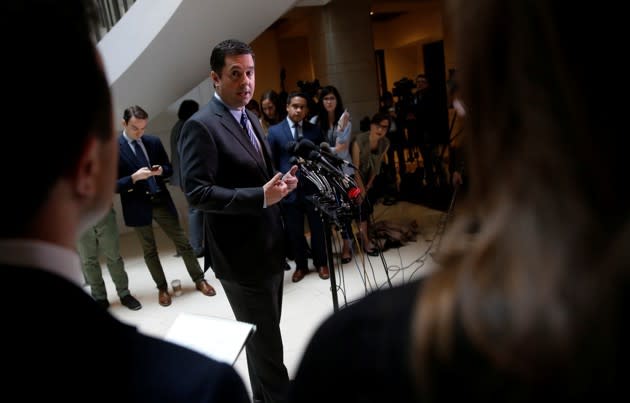
Devin Nunes and Allegations of Improper “Unmasking”
Who: Devin Nunes, chair of the House Intelligence Committee and a Trump transition team member; Ezra Cohen-Watnick and Michael Ellis, White House staffers; Susan Rice, Obama national security adviser
The dirt: On March 22, Nunes, a California Republican, announced he had received mysterious report suggesting vague, inappropriate conduct by Obama administration officials—that Trump transition-team members had been “incidentally collected,” or swept up in surveillance of intelligence targets. When Americans who are not the targets of surveillance are collected this way, their names are redacted, but can be revealed, or “unmasked,” to some top officials at their request. Though Nunes said the surveillance was lawful, he alleged that the Trump officials’ names had been improperly unmasked. Nunes would not say how he obtained the information, did not share it with members of his committee, and rushed to brief the president. A later report from Bloomberg View had Trump officials claiming Susan Rice had requested questionable unmasking.
The upshot: Nunes’s refusal to share his information resulted in acrimony with his Democratic counterpart. Meanwhile, the congressman’s account developed a series of inconsistencies and holes, both in substance and in process. Although he insisted he had not received his information from the Trump administration, it became clear that his source was within the White House. Nunes was eventually forced to recuse himself from the House investigation into Russian interference in the election. Rice has denied wrongdoing, and no further evidence that she improperly unmasked anyone has emerged—in fact, some reports suggest just the opposite.
Read more: The Atlantic, (2), (3); Eli Lake; CNN
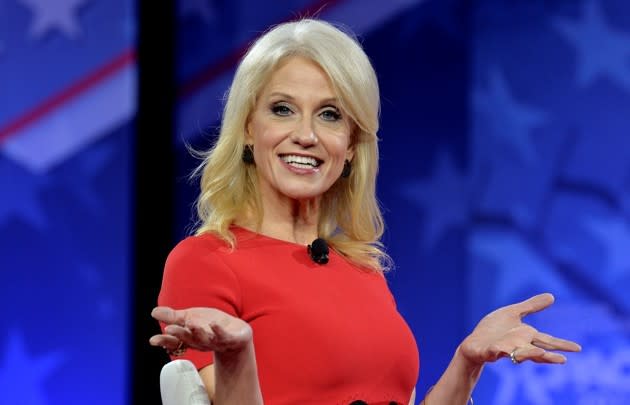
Conflicts of Interest and Ethics Violations
Who: Donald Trump; Ivanka Trump; Donald Trump Jr.; Eric Trump; Kellyanne Conway, counselor to the president
The dirt: Donald Trump has still not offered an adequate plan for addressing conflicts of interest between his business and his office. The president said that he would step away from the Trump Organization, as would his daughter Ivanka, while his sons Donald and Eric ran the business. His faux-blind trust was criticized by ethics observers across the political spectrum, and Eric has suggested in interviews that the division is even more porous than it initially appeared. Ethicists say Trump is in violation of the Constitution’s Emoluments Clause, because foreign leaders can funnel money to the president by staying in his hotels. Separately, Trump counselor Kellyanne Conway broke ethics rules by encouraging people to purchase Ivanka Trump merchandise after Nordstrom announced it would drop her line of clothing. (Despite President Trump’s promise that Ivanka was not joining the White House, she has since taken a job in the West Wing.) Trump’s son-in-law and senior adviser Jared Kushner also appears to have failed to disclose at least $1 billion in loans and stakes in multiple companies.
The upshot: The General Services Administration ruled that Trump was not violating the lease on a hotel in D.C., despite a clause saying no government official can be party to the contract. At least one pending lawsuit seeks to have Trump ruled in violation of the Emoluments Cause. The Office of Government Ethics ruled that Conway had broken rules on endorsements and recommended that she be fired, but the White House rejected the recommendation, and OGE has no authority to levy its own punishment. After public outcry, the State Department deleted a blog post promoting Mar-A-Lago, Trump’s Florida estate.
Read more: The Atlantic, (2); Jeremy Venook’s full accounting of conflicts of interest; Fortune; The Wall Street Journal
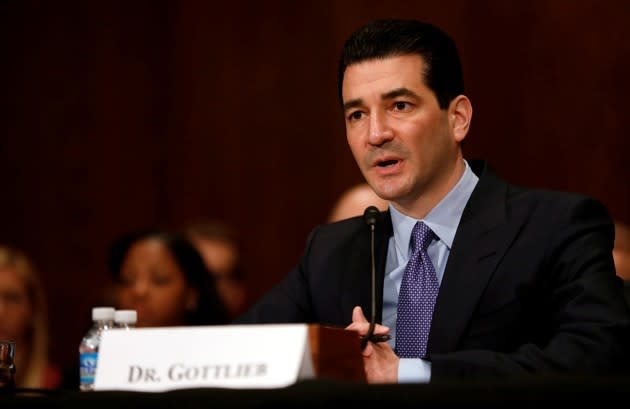
The Revolving Door
Who: Marcus Peacock, former budget adviser; Scott Gottlieb, nominee for FDA commissioner; Michael Catanzaro, energy adviser; Chad Wolf, TSA official; Geoff Burr, Labor Department official
The dirt: During the campaign, Trump promised to “drain the swamp,” proposing a range of rules to limit the revolving door between government and business. Trump’s actions since taking office have been a mixed bag, strengthening some rules and weakening others. (This is not unprecedented—Barack Obama also ended up loosening his own rules.) There are already several worrying case of people moving between the government and major lobbies in both directions.
Marcus Peacock worked briefly in the Office of Management and Budget, but has left for the Business Roundtable, a major lobby. Peacock would have been banned from lobbying for five years, but he was granted a waiver from Trump’s rules.
Scott Gottlieb, Trump’s nominee to lead the Food and Drug Administration, has received millions of dollars from drug companies covered by the FDA over the years. Gottlieb plans to recuse himself from decisions involving multiple drugmakers, including giants Bristol-Myers Squibb and GlaxoSmithKline.
Chad Wolf is the chief of staff for the Transportation Safety Administration, but until he took that job was a lobbyist for a company seeking to have its baggage-scanning device approved by TSA, a deal that could be worth $500 million. When The New York Times contacted Wolf (he declined an interview request), his Twitter account still identified him as a lobbyist.
Michael Catanzaro is Trump’s top energy adviser, in which capacity he is working to roll back Obama-era emissions rules that he previously lobbied against on behalf of energy companies.
Geoff Burr has been hired as a special assistant at the Labor Department. He was previously a lobbyist for a construction-industry trade group, lobbying the department where he now works for things like looser safety regulations and wage rules.
The upshot: Because the Office of Government Ethics has no independent authority to punish violations, most of the onus is on the White House to enforce its own rules. In several of these cases, it appears that Trump administration officials may be in violation of the president’s rules or other existing rules, but it’s very difficult to know for sure. The administration could grant waivers to officials to circumvent rules, but unlike the Obama administration, the Trump administration is not making those waivers public. Of course, the presence of waivers raises its own questions about the efficacy and spirit of the White House’s ethics rules.
Read more: The Wall Street Journal; The New York Times; ProPublica; Bloomberg
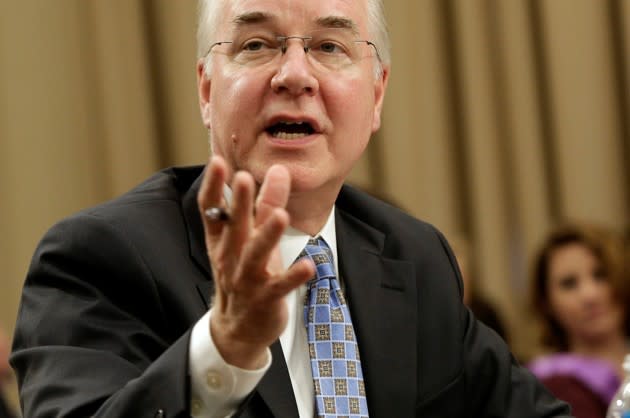
Tom Price’s Dubious Stock Trading
Who: Tom Price, secretary of health and human services
The dirt: Price, a doctor by profession, was previously a U.S. representative from Georgia. In 2012, after a series of revelations about members of Congress profiting by trading stocks with inside information about regulation and legislation, the STOCK Act barred trading on non-public information. Price traded more than $300,000 worth of stock in health companies affected by bills he sponsored or argued for. The largest was an investment of $50,000 to $100,000 in an Australian company called Innate Immunotherapeutics, whose largest shareholder is Representative Chris Collins of New York, a close Trump ally. The stock later doubled in price. During confirmation hearings, Price claimed to have received no special information, but The Wall Street Journal found that Price had actually received a privileged offer to buy. ProPublica also reported that Price also bought $90,000 in drug companies the same day he intervened to kill a rule that would have cut into their profits.
The upshot: The allegations against Price, if proven, could be very serious, as he could have violated federal law. Democrats have asked that the Securities and Exchange Commission investigate Price. When Preet Bharara, the U.S. attorney for Manhattan was unexpectedly fired in March, he had been conducting an investigation into Price’s trades, ProPublica reported. Price denies wrongdoing and says trades were made by his broker without his knowledge.
Read more: The Wall Street Journal, (2); ProPublica, (2)
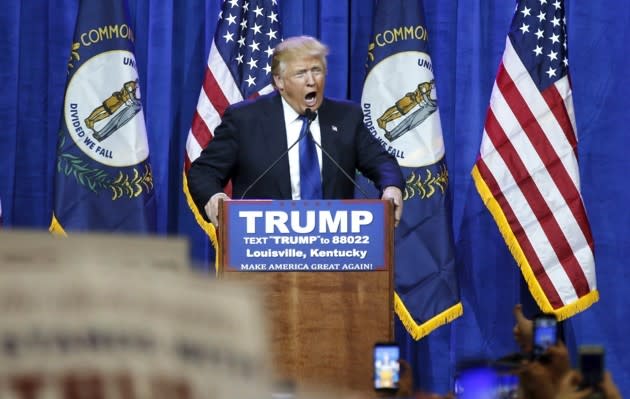
Inciting Violence
Who: Donald Trump
The dirt: The president faces a lawsuit from three people who allege they were roughed up at a campaign rally in Louisville, Kentucky, in March 2016. They blame Trump for inciting violence by saying, “Get ’em out of here.” He has also been sued in Alabama in a similar case.
The upshot: Trump has offered two defenses in Kentucky. First, he says he was not instructing the crowd, though another defendant, accused of conducting an assault, says he was acting because of the candidate’s statement. (A white nationalist leader has actually sued Trump, saying he assaulted a woman at the candidate’s behest.) Second, Trump says that as president he is immune to civil suits. Trump has also claimed that he has presidential immunity from a sexual-harassment case filed by a former Apprentice contestant.
Read more: Politico, (2); The Atlantic
Read more from The Atlantic:
This article was originally published on The Atlantic.


